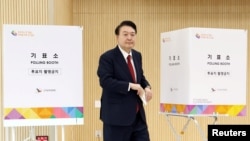The South Korean government says it will push ahead with its foreign policy agenda despite a crushing defeat in parliamentary elections at the hands of a liberal opposition party that promises to push back against President Yoon Suk Yeol's foreign and security policies.
South Korea's Foreign Ministry spokesperson said Tuesday that the Yoon government will press on with its security cooperation with the U.S. and Japan in bilateral settings and in a trilateral framework.
Seoul will "cooperate closely" with the U.S. and Japan to carry out agreements made at a trilateral Camp David summit in August, the spokesperson said in an email to VOA's Korea Service. Those policies were developed in response to North Korea's nuclear and missile threats.
The spokesperson said the Yoon administration will also "continue to strengthen its partnership" with countries in the Indo-Pacific region “to support universal values that include freedom, democracy, the rule of law, and human rights."
The ruling People Power Party (PPP) lost the general election on April 10, securing only 108 seats in the 300-seat National Assembly.
The opposition Democratic Party (DP) won 175 seats but fell short of securing the 200 or more needed for a supermajority that would have allowed them to advance bills for passage without the PPP. Four independent parties secured the rest of the seats.
Bruce Klingner, senior research fellow for Northeast Asia at the Heritage Foundation, said, "The opposition party is expected to step up its criticism of Yoon's foreign policies since it favors a more accommodating stance toward Pyongyang and Beijing, resistance to improving relations with Japan and greater independence from U.S. policies."
Klingner, who served as the CIA's deputy division chief for Korea from 1996 to 2001, continued, "But such policies have less public support due to the failed U.S. and South Korean summits with North Korea in 2018-19, Pyongyang's rejection of all requests for dialogue and escalating provocations."
North Korea said through its state-run KCNA on Tuesday that it had conducted its first nuclear counterattack simulation drills.
The DP mounted criticism against the Yoon administration on Sunday for what it described as China exclusionary policies. It urged the administration to "abandon its biased foreign and security policies," said a report by The Korea Herald based in Seoul.
The Rebuilding Korea Party, a DP partner that won 12 seats in the National Assembly, slammed Yoon for what it called his "one-sided foreign policies centered on the U.S. and Japan," according to the report.
On Friday, Yoon called DP leader Lee Jae-myung and proposed to meet with him for the first time since he took office in May 2022, according to South Korean media. Lee lost the presidential election to Yoon nearly two years ago. The presidential office told the press on Saturday the details and time of their meeting are undetermined.
Evans Revere, a former State Department official with extensive experience negotiating with North Korea, said, "The Democratic Party, together with its opposition partners, may try to use its budget-setting and investigatory powers in the National Assembly to slow or otherwise limit the ruling party's ability to easily pursue its foreign policy and national security agenda."
He continued, "The DP may also try to use dialogue with the ruling party and the Blue House [former presidential residence] to express a willingness to compromise on domestic economic and social legislation in return for changes to President Yoon's foreign policy agenda."
He added, "But President Yoon's commitment to his foreign policy agenda is highly principled and deeply felt, and it seems unlikely that he would yield to such an opposition party."
At a conference that Yoon hosted Monday in Seoul for South Korean diplomats assigned overseas, he described the administration's "global pivotal state diplomacy" as the country's "signature policy." He credited the policy for key achievements such as an upgrade in the country's alliance with the United States and normalization of relations with Japan.
Yoon has pursued his vision for the country to become the "global pivotal state" since taking office in 2022. It calls for South Korea to promote freedom, democracy and the rules-based international order.
Robert Rapson, who served as charge d'affaires and deputy chief of mission at the U.S. Embassy in Seoul from 2018 to 2021, said it remains to be seen whether the DP and its affiliates can force adjustments on external issues such as Japan, China and North Korea, as well as economic security policy.
“But they plan to give it a try, it seems."
VOA’s Kim Hyungjin contributed to this report.





